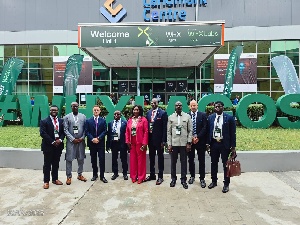- Home - News
- Elections 2024
- News Archive
- Crime & Punishment
- Politics
- Regional
- Editorial
- Health
- Ghanaians Abroad
- Tabloid
- Africa
- Religion
- Photo Archives
- Press Release
General News of Tuesday, 15 April 2025
Source: www.ghanawebbers.com
'State capture in disguise' – Former Dep Minister criticises GoldBod overreach
Former Deputy Housing Minister Dr. Prince Hamid Armah has criticized the government's new gold trade regime.
He expressed his concerns in a Facebook post. Dr. Armah warned that GoldBod represents “state capture in disguise.” He called it a dangerous step toward economic authoritarianism.
In his article titled “GoldBod is not reform. It’s recolonisation,” he targeted the May 1, 2025 policy directive. This policy bans individuals and entities from buying or exporting gold without clearance from GoldBod.
The policy also requires foreign traders to exit the domestic gold market by April 30, 2025. Failure to comply could lead to criminal sanctions.
“This is not policy; it is a state monopoly in disguise,” Armah declared. He argued that it contradicts Ghana's Constitution and trade framework, which support a liberal economy and investor confidence.
Dr. Armah questioned the rationale behind this move, asking, “Since when did we become a command economy?”
He rejected comparisons to COCOBOD, Ghana’s cocoa regulator, calling them flawed and misleading.
“COCOBOD stabilizes farmer incomes; it does not criminalize market participation,” he explained. It works with private Licensed Buying Companies rather than against them.
“COCOBOD regulates and empowers players in the value chain,” he added. In contrast, Dr. Armah described GoldBod as a centralized entity dominating the entire gold value chain.
GoldBod controls licensing, assaying, buying, and exporting while having prosecutorial power over non-compliant actors.
“As someone trained in economic policy and governance, I know this is not regulation,” he wrote. “This is state capture of a commodity market.”
He warned that this regime gives excessive power to political appointees. It risks collapsing investor confidence like cocoa licensing did in the 1970s.
“Centralizing all aspects of gold under one state entity undermines competition,” Dr. Armah cautioned. He noted that it deters foreign capital and echoes past mistakes that harmed the cocoa sector.
He criticized the eight-day transition window as rushed and irresponsible. The new licensing regime remains vague and untested.
“What do we gain? A rushed eight-day transition period?” he asked rhetorically. “The criminalization of businesses that were legally operating just yesterday?”
Dr. Armah stated he is not against reform but opposes what he sees as an opaque approach masquerading as reform.
“You cannot promote Ghana as an investment destination while criminalizing legitimate market participation overnight,” he said.
“Our gold market needs regulation, not state recolonization.”
He called for an urgent review of the policy before it causes more harm than smuggling does.
“This policy must be urgently reviewed,” he concluded firmly. “We are against reform that undermines the economy it claims to fix.”











